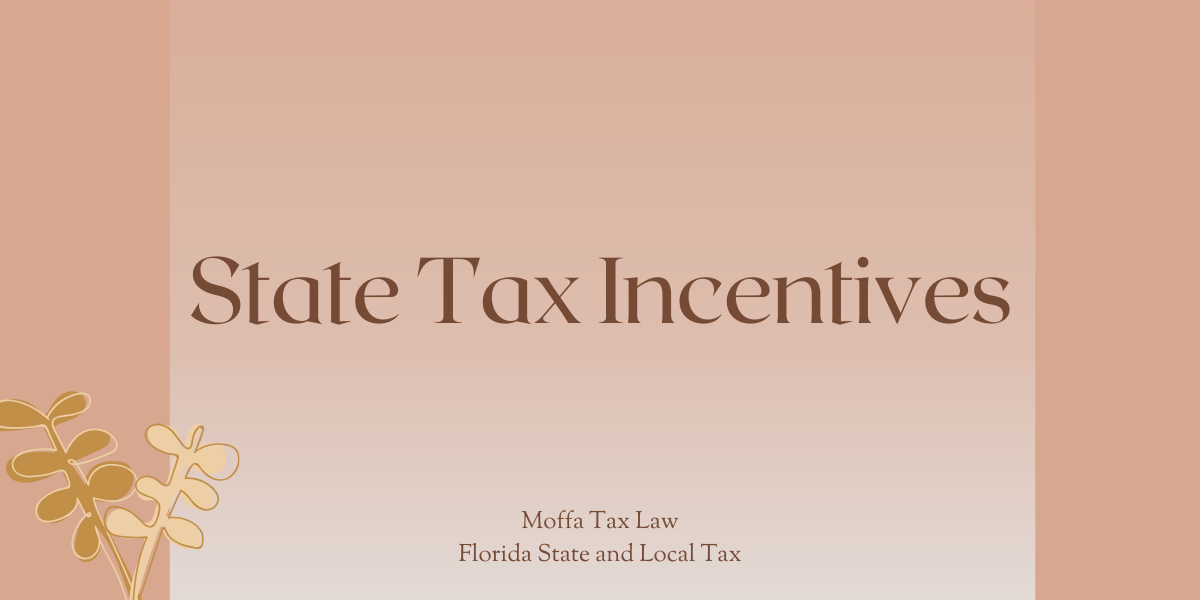NEWS & INSIGHTS


States Compete With Tax Credits: A Deep Dive into May 2025 SALT Incentive Updates
From film festivals to data centers, states are intensifying their competition for economic growth with strategic tax incentives. The May 2025 report from the ABA State and Local Tax Committee’s Incentives Subcommittee highlights a flurry of legislative activity across multiple states, signaling evolving trends in corporate tax policy and state economic development priorities.
🎬 Colorado Lures Sundance with $34 Million Tax Credit
In a headline-grabbing move, Colorado passed House Bill 25-1005 offering a $34 million refundable income tax credit to attract the Sundance Film Festival to Boulder. The credit begins in 2027 and scales through 2036. Sundance chose Colorado over Cincinnati and Park City. An additional $5 million in smaller credits will support existing or smaller festivals in the state.
🏢 California’s $645M Competes Program and Shift to Grants
The California Competes program announced a whopping $645 million in income tax credits for fiscal year 2024–2025. However, a sharp drop in participation due to fewer mega-projects and increased scrutiny has prompted a shift back to cash grant options. A proposed revival of the $60 million grant pool (used from 2021–2023) may be drawing interest from businesses with limited tax liabilities.
⏰ Alabama’s Overtime Exemption Set to Expire
Alabama’s first-in-the-nation exclusion of FLSA overtime pay from gross income is scheduled to sunset June 30, 2025. Efforts to make it permanent failed in committee. The exemption, recently aligned with federal overtime rules for easier compliance, may serve as a model for Delaware, where similar legislation is proposed for 2026–2028.
💻 Arkansas Expands Data Center Incentives
Arkansas passed Act 548 reducing the investment threshold to $100M and creating a new $2B category for multi-site data centers. The definition of “data center equipment” has been broadened and administration shifted to the Department of Finance and Administration. Additional legislation includes:
- Act 881: Corporate HQ relocation credits and ArkPlus modernization.
- Act 882: 5% modernization credit against sales/use tax.
- Act 576: Local development authorities authorized to issue bonds for PILOTs.
- SJR15: Proposed constitutional amendment to allow Economic Development Districts with property tax exemption.
🏭 Arizona’s Qualified Facility Tax Credit Still Going Strong
Arizona continues its Qualified Facility program, authorizing up to $125 million per year in credits through 2030. Key requirements include 80% facility use in manufacturing/R&D, significant wages, out-of-state sales, and health insurance coverage. As of April 2025, more than $113 million remains for allocation.
🏗️ Mississippi Launches Credit for Blighted Property Redevelopment
A new credit—House Bill 1201—provides a 25% income tax credit (or 75% rebate) for qualified redevelopment of blighted or tax-forfeited properties. Projects must meet cost thresholds and third-party certification and be completed within 36 months. Annual caps are set at $2M, with a $10M program limit.
🔍 Data Center Incentives Under Scrutiny
Good Jobs First estimates data center tax breaks now exceed $3 billion per year. Texas leads the pack, followed by Virginia, Illinois, and Georgia. As these exemptions proliferate, critics argue for stricter evaluations of cost-effectiveness and transparency in award processes.
📈 National Trends: Competitive but Cautious
This report reveals a clear pattern: states are aggressively using tax policy as a development tool, but oversight is increasing. Whether through grant alternatives, clawbacks, or sunset provisions, lawmakers are demanding accountability and measurable returns on investment.
For SALT professionals, keeping up with evolving incentive structures is critical. From tracking data center policies to deciphering the interplay between credits and grant alternatives, this is a dynamic—and politically charged—landscape worth watching closely.
Moffa Tax Law | Florida State and Local Tax Attorneys
Colorado offered a $34 million refundable income tax credit to bring Sundance to Boulder starting in 2027.
Fewer large projects and increased scrutiny are pushing a shift toward cash grants as an alternative to tax credits.
It excludes FLSA-defined overtime pay from gross income but is scheduled to sunset in mid-2025.
Act 548 lowered investment thresholds and broadened the definition of qualifying equipment for new and expanding data centers.
A long-running program offering significant credits for manufacturing and R&D investments with strict wage and insurance criteria.
HB 1201 provides a 25% income tax credit or a 75% rebate for redevelopment of blighted or tax-forfeited property.
$645 million for FY 2024–2025, with supplemental grant legislation proposed.
A 5% modernization credit for automation and software costs, offsetting sales and use tax liabilities.
Annual breaks exceed $3B nationally, leading some to question transparency and effectiveness.
States are still highly competitive but are adding oversight tools like clawbacks, audits, and performance thresholds.
Share
Additional Articles by the SALTy Orange at Moffa Tax Law:
NEWS & INSIGHTS States Compete With Tax Credits: A Deep Dive into May 2025 SALT Incentive Updates States Compete With…
NEWS & INSIGHTS Inside the FTA’s May 2025 Committee Report: What State Tax Officials Are Watching Inside the FTA’s May…
NEWS & INSIGHTS State Conformity with the BBA Partnership Audit Rules: Where Are We in 2025? State Conformity with the…

Jeanette Moffa, Esq.
(954) 800-4138
JeanetteMoffa@MoffaTaxLaw.com
Jeanette Moffa is a Partner in the Fort Lauderdale office of Moffa, Sutton, & Donnini. She focuses her practice in Florida state and local tax. Jeanette provides SALT planning and consulting as part of her practice, addressing issues such as nexus and taxability, including exemptions, inclusions, and exclusions of transactions from the tax base. In addition, she handles tax controversy, working with state and local agencies in resolution of assessment and refund cases. She also litigates state and local tax and administrative law issues.


